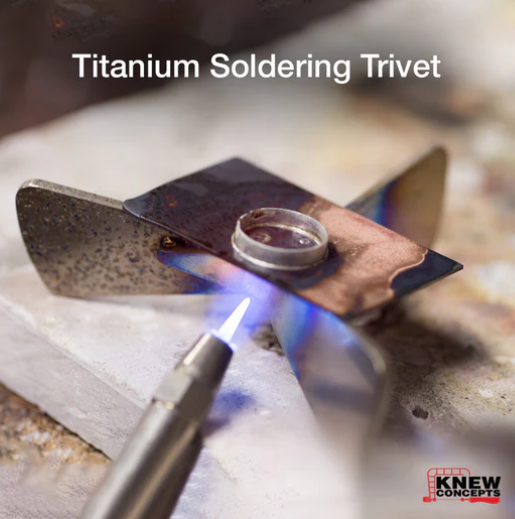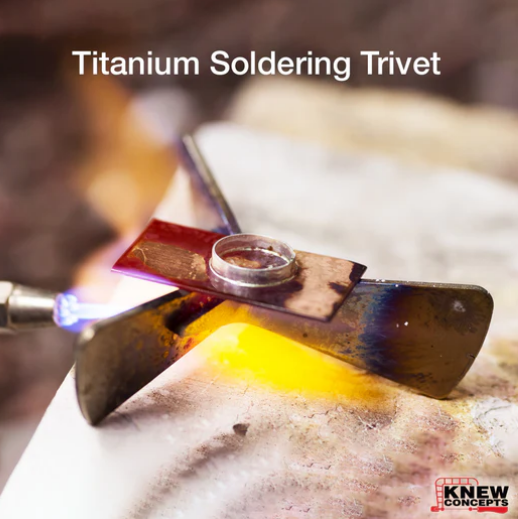Knew Concepts Titanium Soldering Trivet
The Knew Concepts titanium trivets have advantages over traditional iron trivets (or iron screens), such as:
Titanium doesn’t steal heat like iron does, so you can concentrate on soldering your piece, and not the prop.
Solder and enamel don’t stick to titanium, so you don’t need to worry about that either.
The reason you want to get the piece up in the air is so that you can heat from underneath. That will let you do delicate things like soldering bezels down without worrying about melting them, which is a real risk if you heat from the top. The baseplate is usually the heaviest, thickest part of the piece which means that it takes the most heat to bring it up to the proper temperature for soldering. If you can heat the baseplate from the back—where there are fewer delicate bits, there’s less risk to the delicate parts on the front, and your soldering goes easier. You can also heat more aggressively from the back, which will help as well.
The Knew Concepts titanium trivets have advantages over traditional iron trivets (or iron screens), such as:
Titanium doesn’t steal heat like iron does, so you can concentrate on soldering your piece, and not the prop.
Solder and enamel don’t stick to titanium, so you don’t need to worry about that either.
The reason you want to get the piece up in the air is so that you can heat from underneath. That will let you do delicate things like soldering bezels down without worrying about melting them, which is a real risk if you heat from the top. The baseplate is usually the heaviest, thickest part of the piece which means that it takes the most heat to bring it up to the proper temperature for soldering. If you can heat the baseplate from the back—where there are fewer delicate bits, there’s less risk to the delicate parts on the front, and your soldering goes easier. You can also heat more aggressively from the back, which will help as well.
The Knew Concepts titanium trivets have advantages over traditional iron trivets (or iron screens), such as:
Titanium doesn’t steal heat like iron does, so you can concentrate on soldering your piece, and not the prop.
Solder and enamel don’t stick to titanium, so you don’t need to worry about that either.
The reason you want to get the piece up in the air is so that you can heat from underneath. That will let you do delicate things like soldering bezels down without worrying about melting them, which is a real risk if you heat from the top. The baseplate is usually the heaviest, thickest part of the piece which means that it takes the most heat to bring it up to the proper temperature for soldering. If you can heat the baseplate from the back—where there are fewer delicate bits, there’s less risk to the delicate parts on the front, and your soldering goes easier. You can also heat more aggressively from the back, which will help as well.



